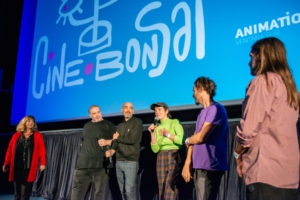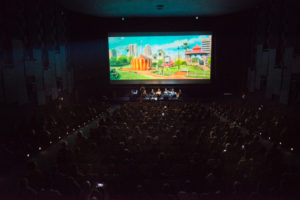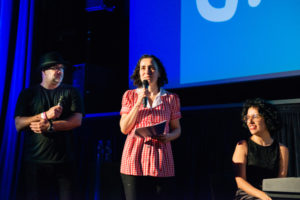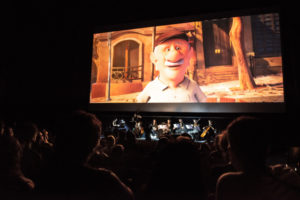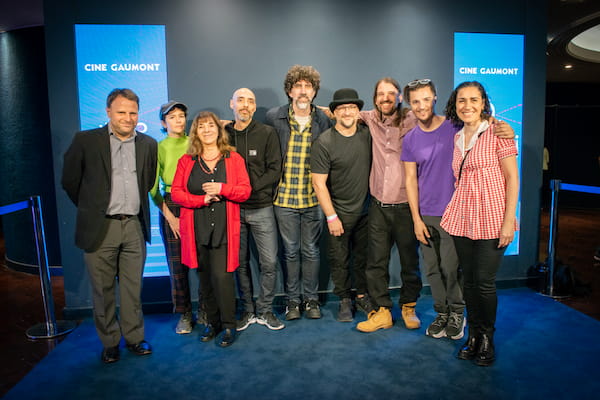
Cine BONSAI: Great Success
The first animated marathon of Argentine short films, Cine Bonsai, was held for the first time. The event was organized by the Animation Department of the National Institute of Cinema and Audiovisual Arts (INCAA) and took place at the Leonardo Favio Hall of the Gaumont Cinema, with free admission.
Divided into three blocks, the day began with the premiere of La calesita, by Augusto Schillaci, winner of the Canal + Prize awarded by the junior jury at the Annecy International Film Festival (France). During the screening, the original soundtrack was performed by pianist and composer Yazmina Raies with an orchestra.
The story of this short film is inspired by the figure of Don Luis, an emblematic rickshaw driver from Liniers, much loved and remembered.
About this, Augusto Schillaci said: “Although it is a fictitious story, the idea was to pay tribute to the calesiteros, to the connection they have with the neighborhood and that sometimes one forgets. In this story the neighborhood is united around the carousel. Nostalgia is also present, and how everything changes with time”.
With great public attendance, the Assistant Manager of Animation, Silvina Cornillón, expressed her gratitude to the Exhibition and Audience Management, the Gaumont Cinema team, CINE.AR, the International and Institutional Affairs Management and the ENERC, and expressed her joy for “providing this space and being able to show the talent of these Argentine directors”. “Making animation requires an enormous effort and this is the icing on the cake; to be able to share them on the big screen, in a cinema like this one, gives meaning to all the work we do day by day”, he added.
Afterwards, he invited the president of INCAA, Nicolás Batlle, who welcomed the Gaumont Cinema, “this true cathedral of national cinema, where we can share experiences and watch a film in community”. About this animation marathon, he said: “It is a very important day for short films and animation. We still have a debt from the Institute, and that is to work harder so that there are more and more animated short films”. At the end, he thanked the musicians for playing live, “just as they originally did at the film screenings in their beginnings”.
The second block began with a special selection of four productions and was moderated by Pablo Conde, artistic director of the Mar del Plata International Film Festival, who began by talking to the audience about the work of animation: “It is a universe that has no end; animation can be whatever its creators want to do. Animation in Argentina has existed for a long time but it doesn’t have all the transcendence it should have, for a lot of reasons that fortunately are being overthrown”. Regarding Cine Bonsai, he commented: “It is a first action of this Deputy Manager’s Office, which has been working on many aspects. In the INCAA there are three animation school centers, in Comodoro Rivadavia, Mar del Plata and Rosario. Keep an eye on all the Institute’s networks to know everything that is going on”.
The following were screened: El árbol ya fue plantado, by Irene Blei, winner of the INCAA Regional National Short Film Competition INCAA in 2018; El after del mundo, by Florentina González, a short film awarded at the Tricky Women festival in Austria, which highlights the work of women in animation; Las peripecias de Sir Percival, by Mariano Bergara, Javier Mrad and Becho Lo Bianco, recently nominated for Best Visual Development of Animated Work at the Quirino Awards and winner of Best Argentine Animation at the ANIMA Festival in Córdoba; and the co-production between Argentina and Spain Loop, by Pablo Polledri, the first Argentine director to win the Goya Award in the Best Short Film category.
At the end of these screenings, Pablo Conde spoke with all the filmmakers, who shared their work experience and revealed the wide variety of their artistic pursuits.
Becho Lo Bianco said that Las peripecias de Sir Percival “was born with images of objects that one has or will appear and a lot of animated exploration”.
Irene Blei talked about the origin of El árbol ya fue plantado: “It was an infatuation with the song, which had been kept since the 70s and was not known because in the middle, between that song and this moment, we had the civil-military dictatorship”.
About Loop, Polledri explained: “Generally loops are used to economize animation in an action, and I was interested in putting that secondary action as the main thing. Because of its repetitive nature, it seemed to me that it could begin to portray routine actions of society”.
Florentina González said that El after del mundo was made during the pandemic period: “It was inspired by certain situations that I was living and that I saw friends and people close to me sharing; that invited me to imagine a post, an after of the world”.
The third block and closing of the event was the screening of Pasajero, by Juan Pablo Zaramella, known for his multi-awarded work Luminaris, who was proud to be present at the activity: “It’s great that the INCAA gives us these spaces to show our work and be able to talk with the public, to exchange, which is something that festivals don’t do much”.
Afterwards, the audience was able to talk with him and his team about the creation process of this short film made with an unprecedented method: using small pieces of paper through the stop motion technique.
Pasajero was screened at the closing ceremony of the prestigious International Animation Festival of Annecy, France, and was the only animated short film from Latin America among the short films shortlisted for this year’s Oscar Awards.
Find here all the pictures of Cine Bonsai and relive the experience of an animated Monday.


